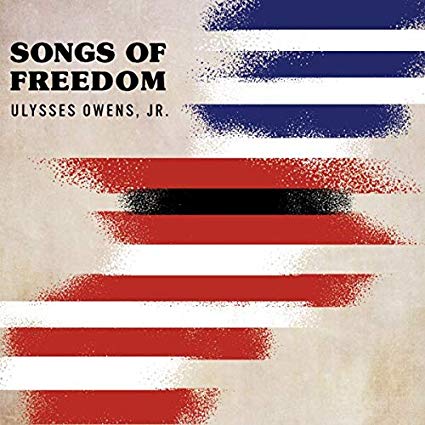Artist: Various Artists
Album: Songs of Freedom
Label: Resilience Music Alliance
Release Date: 3.1.19

To reinterpret some of the most powerful and affecting works of the incomparable Nina Simone, Abbey Lincoln and Joni Mitchell for his Songs of Freedom project, jazz drummer Ulysses Owens Jr. assembled a cadre of uniquely talented vocalists. Their love letters to these iconic recording artists are delivered with a reverence and style all their own.
Tasked with capturing and defining the musical zeitgeist of the 1960s to the present day for Jazz at Lincoln Center’s “100 Years of Song,” Owens could have mashed up a clichéd medley of popular favorites from the period and called it a day. Owens had something more profound in mind, though. Troubled by today’s racial violence and images of police brutality on TV, Owens thought back to the ’60s struggles for civil rights and social justice.
On those bloody battlegrounds, Simone and Lincoln were decorated warriors, wielding weaponized lyrics and pleas for equal treatment wrapped in sounds that could be velvety smooth or provocative and edgy. They influenced generations of righteous agitators and tumultuous lovers that followed, as did Mitchell, although Owens thought of her more as a soothing healer. Songs of Freedom debuted live in September 2016 as part of that Lincoln Center production, and the stylistically diverse and captivating performances captured here in this wondrous house of worship are absolutely dazzling.
Alicia Olatuja is one of Owens’ chosen ones. The singer known for her spectacular solo with the Brooklyn Tabernacle Choir at President Barack Obama’s second inauguration seems to glide through the jazzy sparkle and pop of her sophisticated version of Mitchell’s “Both Sides Now.” She weeps with David Rosenthal’s acoustic guitar tenderness in a vulnerable and elegant reading of Bernard Ighner’s “Everything Must Change,” and the spare gospel void of Andy Stroud’s “Be My Husband” is pierced by Olatuja’s bruised and weary, but still hopeful, supplications and disembodied handclaps. Both were sung by Simone, whose scathing critique of Southern bigotry in “Mississippi Goddamn” is reimagined by Rene Marie with a bustling, boisterous theatricality.
Having survived the turmoil and violence of the ’60s, Marie brings a different, matriarchal perspective to the proceedings. Energetic and gregarious, she’s a bolt of burlesque lightning in the wild, rip-roaring “Driva’ Man,” whereas Theo Bleckmann calmly innovates, layering sheets of humming in a meditative remake of the traditional hymn “Balm of Gilead” and floating along the nodding, earthy reggae strolling through Randy Newman’s “Baltimore.” And up-and-coming singer Joanna Majoko colors a vibrant “Freedom Day” with her versatility, which also happens to be Owens’ calling card as a percussionist.
Efficient, technically brilliant and egoless, but also clever, Owens’ industriously frames his vocalists’ adventurous explorations with brushes and easy propulsion. Rosenthal’s guitar guile, Reuben Rogers’ supportive and nimble bass dynamics and Allyn Johnson’s starlit piano and rich keyboard work cede the spotlight to the singers, preferring to operate in the shadows and lend nuance, shading and purposeful drive wherever needed. They come to the fore on the celebratory closer “Oh Freedom,” dancing with joy with fluid cohesion and heady individual chops.
These Songs of Freedom can make a difference.
—Peter Lindblad







Be the first to comment!